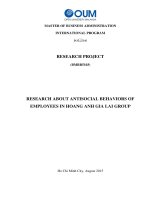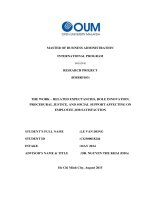Richie research about abortion
Bạn đang xem bản rút gọn của tài liệu. Xem và tải ngay bản đầy đủ của tài liệu tại đây (177.87 KB, 36 trang )
Abortion
Basic
issues
Abortion
Abortion is the intentional termination of a
pregnancy.
A fertilized egg is a zygote, then an embryo
up to 8 weeks, then a fetus.
Some
issues
• When
does
life
begin?
• Does
an
embryo
have
any
worth?
• What
is
the
role
of
the
father
in
abor:on
situa:on?
Statistics
In 1990, 1.5 mil. abortions were performed in
America; that number is declining.
In 2000, 21 out of every 1000 women, of
childbearing age had an abortion making it a
very common procedure.
Risk of death of death is 1/10 that of pregnancy.
Historical
background
English common law- before quickening not a
criminal offence [4th-5th month]
America, 60’s- all states had laws restricting
abortion except to save mothers life
Rov v. Wade, ‘73- laws declared
unconstitutional
Partial birth
abortion
2003 Bush passes partial birth abortion bill
PBA removes with intact dilatation and
evacuation
Definitions
Pro-life: abortion is morally wrong
because it kills a life
Pro-choice: abortion is ok
whenever the mother chooses it
Moderate: morally willing to allow
abortions in certain cases, legally OK
Pro choice says
• Fetuses are neither persons nor members of the moral
community
• Women are undeniable persons and members of the
moral community
• Laws that deny women the right to obtain abortion, or
that make safe abortion difficult to obtain are unjustifiable
violation of the basic moral and constitutional rights
Pro-life says
• A woman’s right to control her body extends to birth
control [and sterilization] but not abortion
• A fetus is a human life and has value
• Permissive abortion laws do not advance the feminist
cause- male support and responsibility in child rearing is
Questions
• Regardless
of
your
stance
on
abor:on,
do
you
think
a
woman
“needs
permission”
from
the
man
who
impregnated
her
to
get
an
abor:on?
• What
if
the
couple
is
married?
• What
if
it
is
a
minor?
Video- Obama and abortion
[moderate stance]
• />
Abortion
Judaism
Abortion
• The
Jewish
tradi:on
treats
abor:on,
like
most
other
things,
as
a
legal
maCer,
• The
Torah
(Exodus
21:22-‐25)
says
the
following:
When
men
fight,
and
one
of
them
pushes
a
pregnant
woman
and
a
miscarriage
results,
but
no
other
damage
ensues,
the
one
responsible
shall
be
fined
according
as
the
woman's
husband
may
exact
from
him,
the
payment
to
be
based
on
reckoning
[or
as
the
judges
determine].
other
damage
ensues,
the
penalty
shall
be
life
for
life,
eye
for
eye,
tooth
for
tooth,
hand
for
hand,
foot
for
foot,
burn
for
burn,
wound
for
wound,
bruise
for
bruise.
Law
• this
passage
draws
a
definite
dis:nc:on
between
the
status
of
the
fetus,
where
only
a
fine
is
due
to
the
vic:m
(actually,
her
husband),
in
contrast
to
the
woman,
where
the
remedy
is
"life
for
life,
eye
for
eye,
etc.”
•
the
fetus
does
not
have
the
same
status
as
a
full
human
being;
it
is
rather
something
less
than
that,
as
the
lesser
remedy
indicates.
At
the
same
:me,
this
passage
announces
that
there
are
penal:es
for
killing
or
injuring
others.
Gestation
• during
the
first
forty
days
of
gesta:on,
the
fetus
is
"as
if
it
were
merely
water.”
i.e.
ra:onales
to
abort
the
fetus
at
that
stage
need
not
be
as
stringent
as
they
are
in
the
next
stage
of
pregnancy,
•
between
the
forty-‐first
day
of
gesta:on
and
birth—specifically
when
the
head
emerges
or,
in
a
breach
birth,
when
the
shoulders
emerge.
Status
of
the
gestating
fetus
•
During
this
period
the
fetus
is
"like
the
thigh
of
its
mother.”
i.e.
neither
a
man
nor
a
woman
may
have
their
thigh
amputated
on
a
whim
because
we
are
not
allowed
to
injure
our
bodies
unnecessarily.
• As
a
result,
abor:on
is
generally
prohibited
according
to
Jewish
law,
not
as
an
act
of
murder
(the
fetus
is
not
a
full-‐
fledged
person),
but
as
an
act
of
self-‐injury.
Endangerment
•
if
the
fetus
poses
a
clear
threat
to
the
mother's
life
or
health,
including
her
mental
health
(that
is,
she
will
go
insane
if
she
carries
the
baby
to
term),
then
an
abor:on
is
required,
even
if
she
herself
does
not
want
the
abor:on.
• To
follow
the
analogy,
if
one's
thigh
had
become
gangrenous,
and
if
the
person
were
likely
to
die
if
the
leg
were
not
cut
off,
then
amputa:on
of
the
leg
would
not
only
be
permiCed,
but
required,
for
we
have
the
duty
to
preserve
our
life
and
God's
body.
Other
cases
• there
is
a
middle
case,
where
abor:on
is
permiCed
but
not
required.
That
occurs
when
there
is
a
greater
threat
to
the
mother's
life
or
health
than
normal
pregnancy
poses
but
not
so
much
of
a
threat
as
to
cons:tute
a
clear
and
present
danger
to
her.
Disability
and
abortion
• most
Conserva:ve
and
Reform
rabbis,
and
some
Orthodox
rabbis,
would
permit
the
woman
to
abort
a
fetus
that
has
a
terminal
gene:c
disease
like
Tay-‐Sachs
or
is
grossly
malformed
(e.g.,
anencephalic)
as
a
func:on
of
the
mother's
mental
health
•
some
would
even
extend
that
permission
to
Downs'
syndrome
if
the
parents
cannot
bear
the
thought
of
raising
such
a
child.
In
sum
• In
most
cases,
though,
abor:on
is
prohibited,
in
some
cases
it
is
required,
and
only
in
a
minority
of
circumstances
is
it
permiCed
but
not
required.
• Judaism
takes
a
posi:on
somewhere
in
between
the
Catholic
[never]
and
American
secular
posi:ons
[almost
any
:me]
and
it
makes
this
a
maCer
of
shared,
public
law
rather
than
individual
conscience.
Question
• What
does
sex
have
to
do
with
religion?
Abortion
Chris:anity
Christianity
and
abortion
• Like
everything
else
in
Chris:anity,
there
is
a
range
of
opinions
• there
is
no
men:on
of
abor:on
in
the
Bible.
• While
some
writers
say
that
early
Chris:ans
held
different
beliefs
at
different
:mes
about
abor:on,
• others
say
that
condemned
abor:on
at
any
point
of
pregnancy
as
a
grave
sin
Views
• Protestant
views
vary,
but
ul:mately
it
is
the
individual's
conscience
that
governs
on
this
maCer
as
it
does
generally
in
Protestant
thought.
• "mainline"
Protestant
denomina:ons
have
clearly
moved
in
the
direc:on
of
accep:ng
family
planning
and
contracep:on
as
well
as
"support
for
legal
access
to
abor:on,
although
with
qualifica:ons
regarding
the
moral
jus:fica:on
for
specific
acts
of
abor:on."
• This
general
trend
among
"mainline"
Protestant
denomina:ons
has
been
resisted
by
Chris:an
Fundamentalists
who
are
generally
opposed
to
abor:on.
Theological
reason
for
children
• Far
from
being
owed
anyone
or
a
right,
childbearing
is
most
appropriately
viewed
as
a
gracious
gib,
not
unlike
God's
own
gratuitous
Presence.
• contract
theory
alone
cannot
explain
the
moral
significance
of
a
person's
willingness
to
have
and
care
for
children,
par:cularly
those
who
are
unexpected,
burdensome,
or
otherwise
unwelcome,
since
these
children
highlight
the
non-‐voluntary,
uncontrollable
and
risky
nature
of
even
"planned"
parenthood









